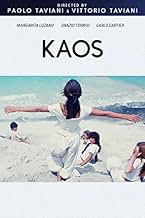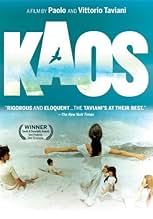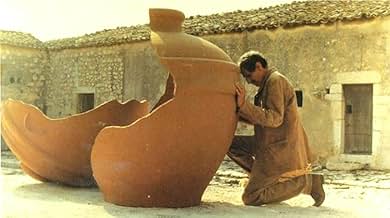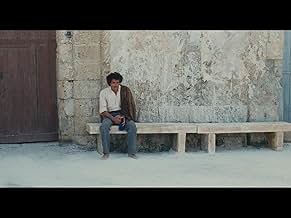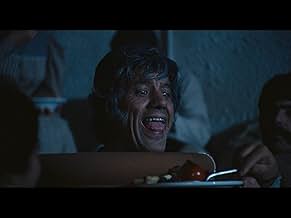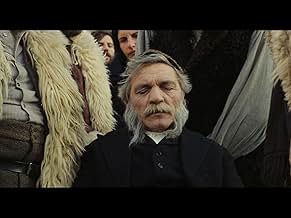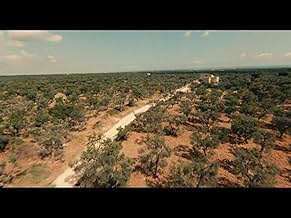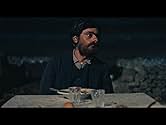IMDb RATING
7.8/10
3.3K
YOUR RATING
Five stories by Luigi Pirandello set in turn-of-the-century Italy.Five stories by Luigi Pirandello set in turn-of-the-century Italy.Five stories by Luigi Pirandello set in turn-of-the-century Italy.
- Awards
- 4 wins & 8 nominations total
Regina Bianchi
- Madre di Pirandello (segment "Colloquio con la madre")
- (as Régina Bianchi)
Featured reviews
I watched this film twice in the 1980s -I think on BBC-but it may have been on channel 4 at the time and was completely captivated by it. it has a haunting quality to it that is hard to surpass and will always stay with you.. Nicola Piovanni composed the music sound score and this Maestro of Music to mood -(see if you can, Caro Diario -Dear Diary Dir.Nanni Moretti as a more modern example of the art) is virtually unknown to the general public over here . Very Sad!.. It is also a complete nonsense that in this technically advanced digital age it is impossible to find a print of this CLASSIC movie -that all film buffs really ought to see-with English SUBTITLES! Spanish ,French and Dutch subtitle versions are around and findable on DVD but ALAS... non comprarlo Inglese!-How Insular! In addition, A Bande Originale -Soundtrack "KAOS" was released on Cd in the early 90s on the Milan label (Europe-USA and S.America?), but again the niche British public not catered for. Bizarrely, when shown on TV in the 80s the movie carried English subtitles-so how does this work then? Anyway back to the film. Enjoy the opening visually stunning shots of the Crow "eagling" its way through mountain landscape and let the accompanying music sink in and you're hooked!.without going into detail-thats for you to discover-the Taviani Bros really bring out the spiritual essence of the Sicilian persona characterised in Pirandello's daily Novellas.It is a flighted sentiment soaring over a gravitated earthy reality-Sicilian Style.This is Cinema at its most alluring.Do see it if it becomes available.
Kaos is one obvious masterpiece of the Taviani brothers. Unfortunately I can not explain the title. But I don't think there is a clear explanation or important message in any of the stories either, in contrast with Kobayashi's Kwaidan (1964), which consists clearly of four stories about ghosts. Kaos seems to deal with family or legacy in general. There are five fairy-tales from Luigi Pirandello about ordinary people and the curious small worlds (or illusions) they find themselves in. I'm not going to reveal exactly what happens in the stories. It's just fantastic and a little nostalgic to watch the strange events and behaviour of different people for three hours without fancy special FX. Credit to cinematographer Giuseppe Lanci (Nostalghia, 1983) and composer Nicola Piovani of course, who did a surpassing job. The performances of the actors are great and never overdone. That wouldn't be appropriate for such a sober work of cinema that could have taken place 200 years ago. It may be not an important film, but it IS unforgettable, timeless and will become one of your personal favourites.
10 points out of 10 :-)
10 points out of 10 :-)
Which, unfortunately is impossible for three hours. I've seen it two times in the cinema. The characters are so good, and are given all the time and space to develop starting with MariaGrazia. I really can't think of a movie that's made with more love and dedication. La Giara is a rare but welcome break and watch how Franchi and Ingrassia interact, watch the beauty of baby Bata's eyes in Mal di Luna. Just find out all those details and you won't be disappointed. Having seen Italy after watching KAOS was a feast of recognition, it's really like that, the villages where time stands still, the people, go and see it and you won't be disappointed.
The Taviani Brothers evoke the mystery, drama, and stark beauty of Sicily in this wondrous three-hour film, with its four earthy stories and sublime epilogue. In "The Other Son" a demented Sicilian mother (Margarita Lozano) longs to hear from her sons who have emigrated to American and forgotten her,. Memories of a traumatic rape experience as a young woman prevent her from being able to accept the love of her only devoted son who follows her around with his cows. "Moon Sickness" tells about a young bride who discovers that her husband likes to howl at the full moon. She is not without an erotic moonsickness of her own which makes her crave sex wit her cousin when the husband is unable to perform his marital duties. "The Jar" features comedians Franco Franchi and Ciccio Ingrassia in a classic comic narrative about a mean landowner's large broken olive jar and the jar-mender who gets trapped inside and their ensuing battle of wits. "Requiem" deals with rural shepherds who want to have a graveyard to bury thir dead. In the epilogue "Conversation with Mother", we see playwright/storyteller Luigi Pirandello returning to his native Sicilian town after years of success on the mainland. He encounters the spirit of his mother who recounts a fabulous fairy-tale journey taken when she had been a child. It is a stunning twenty-minute sequence that must surely rank with the best moments in the history of Italian cinema. The images of the children rolling down the mountain of pumice on the "Pumice Island" are of a poetic lyric intensity. The shot of Pirandello sitting silently in the chair that no longer contains the mother he had been speaking to is also utterly moving. Nicola Piovani's passionate and transporting musical score (he would later do the music for LIFE IS BEAUTIFUL)adds immeasurably to the the experience of this powerful work of art.
10wobelix
Once Sicily was the center of our western world, and this film shows us all the beauties of far, far away, together with a Pastorale worthy of a Beethoven Symphony.
No No, Nicola Piovani composed the unforgettable music all by himself.
This film is timeless, with an imagery, thanks to master Giuseppe Lanci, that is as well sober as breathtakingly beautiful.
There is not one weak actor and the stories are from Luigi Pirandello, who aimed to make one gorgeous novella for each day of the year.
KAOS of the Taviani-brothers could, or maybe even should, be watched every day of the week. This must truly be the most beautiful cinematic achievement ever.
No No, Nicola Piovani composed the unforgettable music all by himself.
This film is timeless, with an imagery, thanks to master Giuseppe Lanci, that is as well sober as breathtakingly beautiful.
There is not one weak actor and the stories are from Luigi Pirandello, who aimed to make one gorgeous novella for each day of the year.
KAOS of the Taviani-brothers could, or maybe even should, be watched every day of the week. This must truly be the most beautiful cinematic achievement ever.
Did you know
- TriviaThe title of the movie comes from a quote of Luigi Pirandello, the author of the book the movies is based on. Pirandello used to say to be a "son of chaos", since he was born in Càvusu, a small village, whose name came from the Greek "Kàos", "chaos".
- Alternate versionsTheatrical release in Italy did not include the segment "Requiem".
- ConnectionsEdited into Bellissimo: Immagini del cinema italiano (1985)
- How long is Kaos?Powered by Alexa
Details
Box office
- Gross US & Canada
- $325,717
- Opening weekend US & Canada
- $11,412
- Feb 17, 1986
- Runtime
- 3h 7m(187 min)
- Sound mix
- Aspect ratio
- 1.85 : 1
Contribute to this page
Suggest an edit or add missing content



